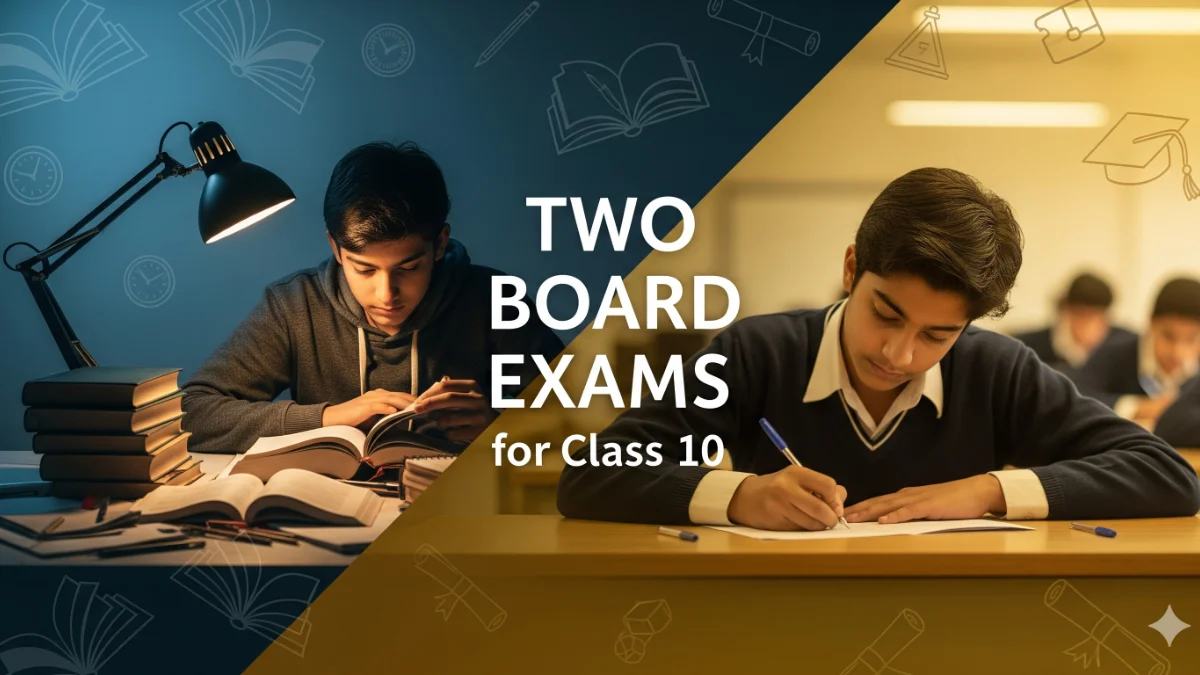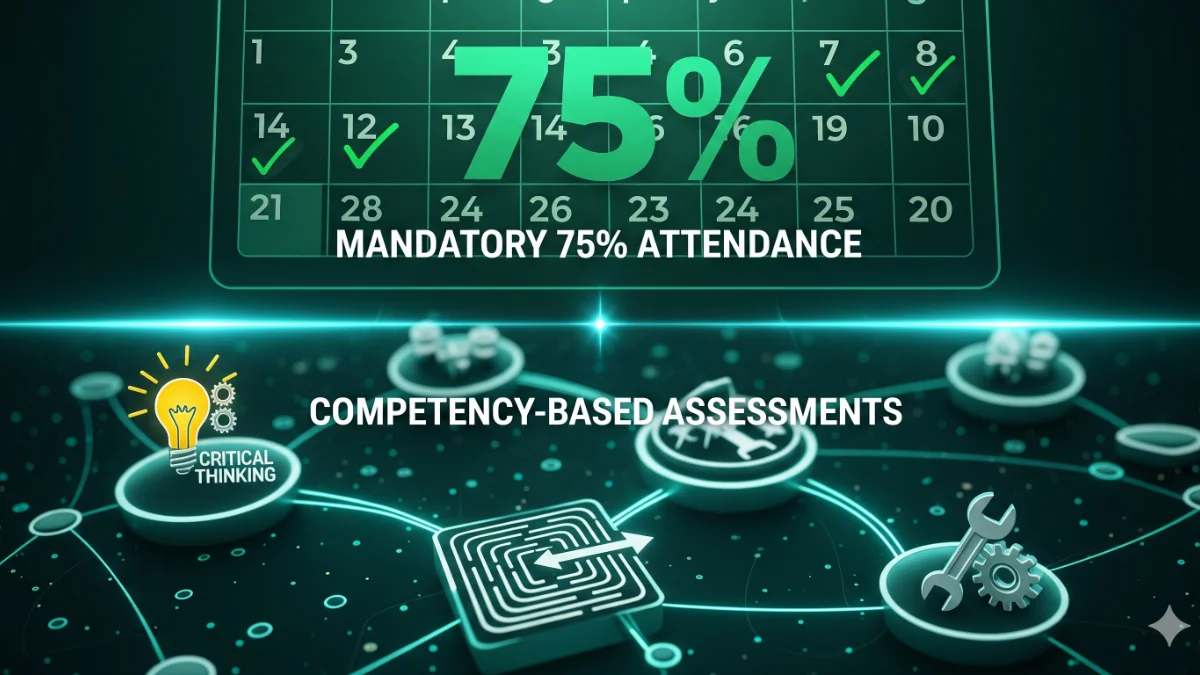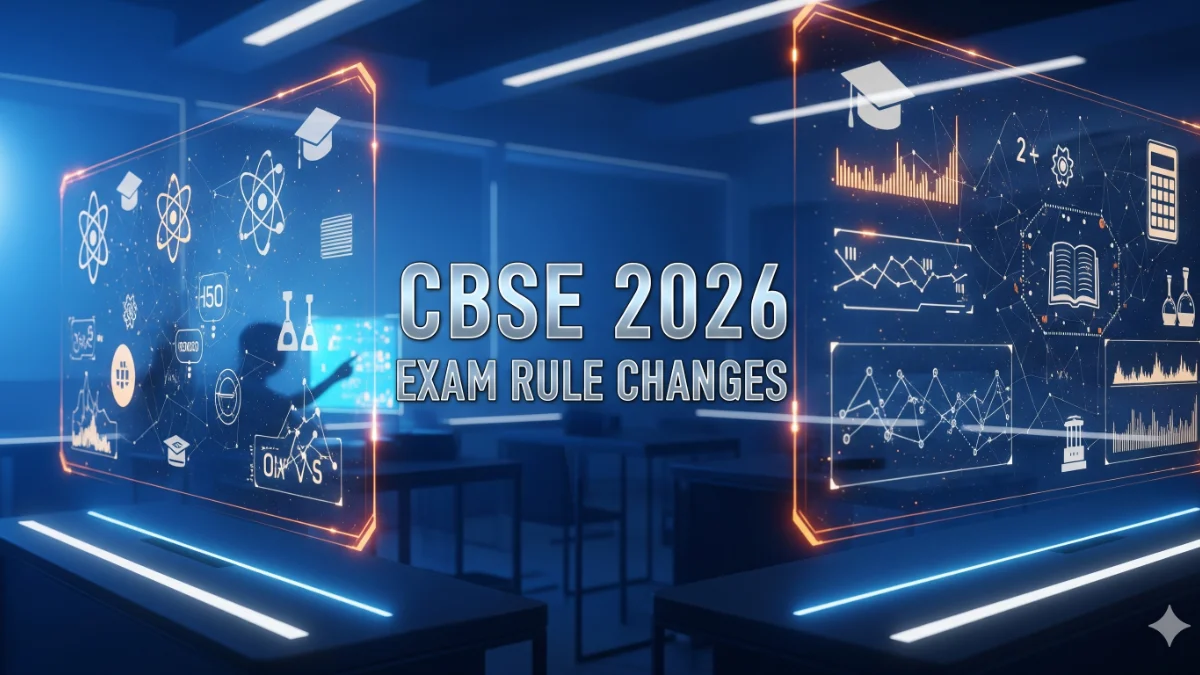Introduction:
The Central Board of Secondary Education (CBSE) announced sweeping changes for the 2026 board exams for Classes 10 and 12, effective from the 2025–26 academic session, as part of its alignment with the National Education Policy (NEP) 2020. Unveiled through circulars and draft schemes starting February 2025, the reforms introduce a dual-exam system for Class 10, mandatory 75% attendance, competency-based assessments, and stricter registration protocols. Class 10 students can now appear for exams in February (mandatory) and May (optional for improvement), with the best score counted, aiming to reduce exam stress. Class 12 exams remain single-phase but include new subject options and digital evaluations. With 26.6 lakh Class 10 and 20 lakh Class 12 students expected to participate, these changes aim to foster flexibility, reduce rote learning, and align with global educational standards. Why does this matter? The reforms reflect India’s push toward a skill-based, student-friendly education system under Viksit Bharat, but challenges like logistical coordination and teacher training loom. This article details the changes, their implications, implementation, and stakeholder perspectives, drawing on official CBSE sources and media reports.
Key CBSE 2026 Exam Rule Changes
-
Two Board Exams for Class 10:
- Structure: Class 10 students will have two exam opportunities per year: a mandatory main exam (February 17–March 6, 2026) and an optional improvement/compartment exam (May 5–20, 2026). The better score counts on the final marksheet.
- Eligibility: Students passing the February exam can retake up to three subjects (e.g., Maths, Science, Social Science) in May for improvement. Those failing one or two subjects can attempt them in May (compartment category). Students failing three or more subjects are marked “Essential Repeat” and cannot take the second exam, per CBSE’s draft scheme.
- Results: April (first exam), June (second exam); final marksheet issued post-May exams, available via DigiLocker.
- Purpose: Reduces high-stakes pressure, aligns with NEP 2020’s flexibility goals.
-
Mandatory 75% Attendance:
- Students must maintain 75% attendance in Classes 10 and 12 to be eligible for board exams, linked to internal assessments (projects, practicals), conducted once before February exams.
- Relaxations apply for students with special needs or sports commitments, per a dedicated CWSN portal, but strict enforcement ensures academic integrity, per CBSE’s August 4, 2025, directive.
-
Competency-Based Testing:
- Exams will emphasize conceptual understanding, critical thinking, and real-world applications, with 50% of questions (MCQs, case studies) being skill-based, reducing reliance on rote learning.
- A nine-point grading scale replaces the five-tier system, with the top 12.5% of students earning an A1 grade.
-
Class 10 Syllabus and Levels:
- Syllabus reduced by ~15% to focus on core concepts and skill development.
- Science and Social Science now offered at Basic and Advanced levels, following the Mathematics model (Standard: Code 041; Basic: Code 241), starting 2026–27 for Classes 9–10, per The Times of India.
-
Class 12 Updates:
- New subject options introduced, with STEM subjects planned for Basic/Advanced levels from 2026–27 (Class 11 onward).
- Digital evaluation methods implemented for consistency, aligning with NEP 2020.
-
Registration and APAAR ID:
- Mandatory registration for Classes 9 and 11 via the Pariksha Sangam portal, requiring APAAR ID linkage (except for overseas students).
- Verification slips issued; corrections allowed November 14–28, 2025. Late fees apply post-deadline, with risks of disciplinary action or school disaffiliation for errors, per CBSE circulars.
-
Special Provisions:
- Sports students facing exam clashes can take rescheduled exams post-February cycle.
- Winter-bound schools and students with special needs have tailored schedules, per The Indian Express.

Implementation and Timeline
- Exams Start: First Tuesday after February 15, 2026 (February 17).
- Schedule:
- Class 10 Phase 1: February 17–March 6, 2026; Phase 2: May 5–20, 2026.
- Class 12: February 17–April 4, 2026.
- Results: April 20, 2026 (Class 10 Phase 1); May 20, 2026 (Class 12); June 30, 2026 (Class 10 Phase 2).
- Registration: List of Candidates (LOC) submission for main exams: September–October 2025. Corrections: October 13–27, 2025.
- Internal Assessments: Conducted once, before February exams; marks apply to both attempts.
CBSE will host a webinar in September 2025 to clarify rules, per testbook.com. Schools must ensure accurate data, CCTV compliance, and teacher assignments for evaluations.
Stakeholder Impacts
- Students: Reduced stress with two exam chances; focus on skills over memorization. Challenges include managing full syllabus for both exams.
- Teachers: Need training for competency-based assessments; tools like LEAD’s mock tests and trackers recommended, per leadschool.in.
- Parents: Must monitor attendance and guide exam choices; provisional Class 11 admissions possible post-April results via DigiLocker.
- Schools: Stricter compliance with registration, APAAR IDs, and CCTV mandates; risk of disaffiliation for violations.
Expert Opinions and Reactions
- Sanyam Bhardwaj (CBSE Exam Controller): “The first phase is mandatory, the second optional; best score retained to reduce stress,” per The Economic Times.
- LEAD (Edtech Platform): “Digital tools like skill trackers and mock exams will prepare students for the new system,” per leadschool.in.
- Apeksha Agarwal (Jagran Josh): “A paradigm shift to reduce exam anxiety and promote lifelong learning, but effective planning is key.”
- X Sentiment (@EduUpdatesIN): “Two exams are great, but scheduling and syllabus coverage need clarity—schools must step up.”
Concerns include logistical strain (exam center coordination) and teacher readiness for competency-based questions, per The Indian Express.
Historical Context and NEP 2020 Alignment
CBSE’s reforms stem from NEP 2020’s push for flexible, holistic education. Previous changes included a 30% syllabus cut during COVID-19 and optional board exams in 2010 (later reversed). The dual-exam system, proposed in February 2025 and finalized post-public feedback, mirrors global models like the UK’s modular assessments. The nine-point grading and Basic/Advanced levels aim to cater to diverse learners, reducing coaching dependency.
Statistics: Scale and Scope
- Students Affected: ~26.6 lakh (Class 10), ~20 lakh (Class 12).
- Exam Centers: To be standardized; no “self-centers” allowed.
- Syllabus Reduction: ~15% for Class 10.
- Question Format: 50% competency-based (MCQs, case studies).
- Subscription Impact: Registration rules tightened, with 100% APAAR ID compliance mandated.
| Metric | Class 10 | Class 12 |
|---|---|---|
| Students (Lakh) | 26.6 | 20 |
| Exam Phases | 2 | 1 |
| Attendance Req. | 75% | 75% |
| Result Dates | Apr/Jun 2026 | May 2026 |
Data from The Economic Times, CBSE circulars.
Potential Impacts: Opportunities and Challenges
- Opportunities:
- Reduces exam stress, aligns with Viksit Bharat’s skill-based education vision.
- Faster Class 11 admissions via April results.
- Supports diverse learners with Basic/Advanced options.
- Challenges:
- Logistical strain on scheduling two exams.
- Teacher training needed for competency-based assessments.
- Risk of confusion in registration/APAAR compliance.
The reforms could set a global benchmark but require robust implementation, per The Times of India.

Conclusion: A Student-Friendly Shift with Challenges
CBSE’s 2026 exam rule changes, with dual exams for Class 10, 75% attendance mandates, and competency-based assessments, mark a progressive step toward reducing stress and fostering skills, aligning with NEP 2020 and Viksit Bharat. While promising, schools and teachers must adapt swiftly to ensure success. Students, prepare with mock tests and focus on concepts; updates available on cbse.gov.in and nuvexic.com.
FAQ
What are the CBSE 2026 exam changes for Class 10?
Two exams (February mandatory, May optional); best score counts.
Is the 75% attendance rule mandatory?
Yes, for Classes 10 and 12, with relaxations for special cases.
What is competency-based testing?
50% questions focus on skills, critical thinking, and applications, not rote learning.
When are the 2026 exams scheduled?
Class 10: February 17–March 6, May 5–20; Class 12: February 17–April 4.
Is APAAR ID mandatory?
Yes, for Class 9/11 registration, except overseas students.



